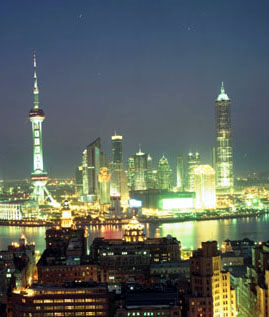


There are two images that spring to mind when people mention Asia and the environment in the same context. From the idea of an exotic, far-off locale in the Orient that is lush and praised by traveler's accounts like Marco Polo's trip to the Orient, to poets that include Samuel Coleridge glorifying the land, and even to Lonely Planet backpacker's guides, the first image of Asia shows a place that can exist only in traveler's dreams. This is an Asia that does indeed exist-- but possibly for not much longer.
The second idea of Asia is what is quickly transforming with modernization and industrialization, taking a page from Westernization (while at the same time criticizing it), very reminiscent of the traumatic Industrial Revolution of Europe in the 19th century.
So whether it is the exotic Taj Mahal of India and Great Wall of China that we imagine when someone mentions Asia, or it is the Beijing smog and Bhopal tragedy, these all exist in the same Asia, but different contexts. The question is, how long before these lines blur and we see industrial waste in the waterways of the Taj Mahal or a thick, black smog eclipsing the sun over the Great Wall?
One way to find that out is to become environmentally and geographically aware. China and India--the two giants of East and South Asia-- are in the process of rapid economic and population growth. As a result of that, however, the environment is taking a hit, for in order to overcome third-world living standards at the speed both countries want to proceed at, they choose not to take their time, as the forests and rivers prepare to depart, followed shortly by the ozone.
The risk in discussing the environment in the same context as the massive economic booms of India and China inc. is that one undermines the image both countries wish to portray of themselves. With China, it is a bad idea to discuss the destruction of the environment and China should perhaps grow a little bit slower, lest one gets labeled a dissident and disappears off the face of the earth. With India, its issues are very public, but one can not avoid its attraction for outsourcing due to its English advantage and tech sector, all inside airconditioned buildings under fluorescent lights as people die of the smog and heat outside.
For honest information on India's environment, one goes to India Together, a news site that is very up-to-date and with an easy interface to go with its simple-but-attractive color scheme. Stories are very diverse and they go beyond the simple laws and news updates on measures being taken, but individual opinions and in-depth analyses of a variety of issues that are ongoing in India. One example of this is in an article (http://www.indiatogether.org/2007/jan/env-expert.htm) on the debate over whose expertise is more valuable in terms of advising what to do and what can be done or what should be done over the use of forest lands for non-forest use, which is very objective and informative, detailing the background of the issue, the significance, and current news on how the issue is developing. There is such a wealth of information that it even has its own RSS feed located at the bottom of the page. Its location is conveniently found (and not only highly recommended, but highly encouraged to view) at http://www.indiatogether.org/environment/.
Sadly, the site that is least helpful-- no thanks in part to its interface and abundance of text or lack of not even monthly updates (the last update was November 2006)-- is the official government website of India. The problem with this site is it seems more like an index listing for the government officials to navigate through-- which seems to be the case, as nobody would feel inclined to wade through the site, due to the difficulty of navigation through the site, many of which are broken links. Most of the information is also in .pdf files, which one is more inclined to print out instead of utilizing the Internet to view. They are easily found (and not highly recommended) at http://envfor.nic.in/.
Coming along to China, the most informative source comes from the outsiders, for all the information that the government has is reserved for its officials, lest the statistics and visuals that reveal the price of progress hinder the image China wishes to show to the world and its population. A welcoming note is that it comes from a fellow blogspot user, with good news feed of select articles and links. Though a very recent site, it is perhaps the place to go for one's environmental fix, located at http://china-environmental-news.blogspot.com/
Not surprisingly, the most informative source comes from the official government site, but with a twist: almost all the information shows how the government is combatting pollution, and all causes of pollution are by individuals. The government website essentially says that its hands are clean of causing any pollution, but it is willing to get its hands dirty to clean up their country. A wealth of information is available, but it should be taken with a pinch of salt. Well, perhaps a shaker, but nonetheless, one should observe the information cautiously. For the daring, the site is located at http://english.sepa.gov.cn/.





